
ICAS Maritime Affairs Handbill (online ISSN 2837-3901, print ISSN 2837-3871) is published the last Tuesday of the month throughout the year at 1919 M St NW, Suite 310, Washington, DC 20036.
The online version of ICAS Maritime Affairs Handbill can be found at chinaus-icas.org/icas-maritime-affairs-program/map-handbill/.
Increasing Melting of West Antarctic Ice Shelves May Now Be Unavoidable
October 29 – The Maritime Executive
[The Antarctic, Global]
New research argues that ice losses in vulnerable West Antarctic ice shelves are nearly inevitable this century due to warming waters, suggesting that the previous predictions on sea level rise may be too conservative. The research argues that rising ocean temperature, largely linked to carbon emissions, will cause widespread ice-shelf melting even in the vital regions for ice-sheet stability.
Two ‘pristine’ deep-water reefs in Galápagos discovered
October 28 – The Washington Post [Paywall]
[Pacific Ocean]
The Schmidt Ocean Institute announced that an international group of researchers have discovered two “pristine” coral reefs in the waters off the Galápagos Islands in the Eastern Pacific. The reefs, located about a quarter of a mile below the surface and within the boundaries of the Galápagos Marine Reserve, are suspected to be thousands of years old.
Greenpeace ship to tour Philippines to amplify call for climate justice
October 26 – PhilStar Global
[Global, Southeast Asia]
Greenpeace’s Rainbow Warrior ship will return to the Philippines in November 2023 to draw attention to climate-impacted communities and demand accountability from major polluters. The Philippines is highly vulnerable to climate change, and this visit also notably coincides with the 10th anniversary of Super Typhoon Yolanda (Haiyan).
Japan and Denmark to tie up on floating offshore wind technology
October 25 – The Japan Times [Paywall]
[Europe, East Asia, Global]
Japan and Denmark have signed a letter of intent to create a cooperative framework involving industry, regulation, and academia to advance research and development in floating, offshore wind power technology to combat climate change. Additionally, they may be planning to discuss taking the lead in creating global standards for the industry.
Billions of crabs went missing around Alaska. Scientists now know what happened to them
October 20 – CNN
[The Arctic, United States]
The snow crab harvest season in the U.S. state of Alaska was canceled for the second consecutive year in a row due to insufficient supply of snow crabs. A study conducted by scientists from the U.S. National Oceanic and Atmospheric Administration suggests that warmer ocean temperatures in Alaska potentially caused the death of billions of snow crabs in recent years.
Atlantic Hurricanes Are Getting Stronger, Faster, Study Finds
October 20 – The New York Times [Paywall]
[Atlantic Ocean, Global]
A recent study reveals that Atlantic hurricanes are now twice as likely to rapidly intensify from weak storms into Category 3 or higher hurricanes within 24 hours. Among other concerns, rapid intensification complicates weather forecasting and can leave officials with insufficient time for evacuations, causing more serious damages to local communities.
These houses are at risk of falling into the sea. The U.S. government bought them.
October 16 – The Washington Post [Paywall]
[United States]
The U.S. National Park Service has bought two homes for over US$700,000 with the intent to demolish them as these houses face imminent collapse into the Atlantic Ocean due to rising seas, intense storms and unceasing erosion.
Coastal Carbon secures $1.6 million towards carbon credit assessment tool
October 10 – The Fish Site
[Canada, Global]
Canadian startup company Coastal Carbon has received $1.6 million in funding from Canada’s Ocean Supercluster to advance the development of its “small, non-intrusive sensors” that “remotely measure seaweed biomass and quantify those data using artificial intelligence.” These sensors could also be used to quantify blue carbon credits; a necessity for both seaweed farmers and the industry.
Wall Street urged to back Indigenous peoples as protectors of forests and oceans
October 5 – Reuters
[Global, United States, The Americas, South Pacific]
At Climate Week in New York in September, a group of government officials, business executives, nonprofit activists and Indigenous leaders began analyzing how to turn the Global Biodiversity Framework—a commitment made by 200 governments in Montreal in December 2022 “to conserve 30% of the world’s lands and oceans by 2030”—into reality. Several task forces were launched, each of which emphasize the trillions of dollars needed in capital flows towards biodiversity protection.
Dutch govt, maritime sector pledge €60 million to turbocharge shipbuilding innovation
October 30 – Offshore Energy
[Europe, Global]
On October 26, the Dutch government launched a joint €60 million investment venture with the maritime sector to drive innovative shipbuilding over the next two years. The extensive agenda includes ‘25 measures to address 25 bottlenecks, categorized into five lines of action’ holistically aimed at driving the clean energy transition and ‘ensuring economic and military security.’
Signal: North Sea shipping traffic disrupted by sunken cargo vessel
October 26 – Ship Technology
[North Atlantic, Europe]
On October 24, the UK-flagged inland bulker cargo ship the Verity collided with the Bahamian-flagged bulker ship the Polesie close to the German island of Heligoland. The collision resulted in the sinking of the Verity and at least one of its seven crew members dead, according to Germany’s Central Command for Maritime Emergencies.
Australia decides against canceling Chinese company’s lease of strategically important port
October 20 – Associated Press
[Australia, China, Global]
The government of Australia said it will not cancel a Chinese company’s lease on a commercial port in Darwin. The renewal was in question over concerns that the firm’s operations pose a security risk because of its additional use by U.S. troops during training exercises.
Putin praises ‘dear friend’ Xi, pitches Russia’s Northern Sea route
October 18 – Reuters
[Russia, China, The Arctic]
While attending the Belt and Road Forum in Beijing, Russian President Vladimir Putin praised China’s Belt and Road Initiative and invited “interested states” beyond “partners” to “participate directly in its development.” President Putin also said that year-round navigation along the entire Northern Sea Route, a route within Russia’s Arctic exclusive economic zone, will be possible “as soon as next year.”
Adani’s New Mega Port to Lure World’s Biggest Ships to India
October 15 – Bloomberg [Paywall]
[South Asia, Global]
India has opened its new transshipment container port of Vizhinjam in Kerala, located near the southernmost tip of India. Largely made possible by Indian billionaire Gautam Adani, it is the first of its kind in the country as it is suitable for the world’s biggest container ships.
Moscow cuts funding for icebreakers
October 13 – Arctic Today
[The Arctic, Russia]
The Russian government is considering decreasing its budget for the construction of icebreaking vessels over the 2024-2026 period by 5,24 billion rubles. The proposed budget is currently under discussion at the State Duma.
Russia attacks Ukraine’s Danube ports with drones
October 12 – Politico
[Black Sea, Europe]
On the night of October 11, Russia attacked a Ukrainian port on the Danube River near the Romanian border, taking place two days after Ukrainian President Volodymyr Zelenskyy met with Romanian President Klaus Iohannis in Bucharest to discuss Ukrainian grain exports through Romania.
China Is Gaining Long-Coveted Role in Arctic, as Russia Yields
October 2 – The Wall Street Journal [Paywall]
[The Arctic, China, Russia]
Facing increasing pressures on resources due to the Ukrainian war, Russia has seemingly turned to China for help with developments within the Arctic Circle. Chinese energy companies are filling in some of the space left by their Western counterparts, causing a surge in shipments of crude through the Northern Sea Route in recent weeks.
Live: China’s first geological exploration of 3,000 meters into deep sea is underway
October 1 – CGTN
[South China Sea, Indo-Pacific]
CGTN released a live recording of China’s first 3,000 meter deep-sea geological exploration. This exploration was the first of its kind conducted by China through the use of self-developed equipment. The video consists mostly of interviews with the crew of the ship.
‘Might is Right’ has no place in maritime order: Rajnath’s veiled dig at China
October 30 – The Hindu
[Indian Ocean, Global]
India’s Defense Minister Rajnath Singh addressed the Goa Maritime conclave on October 30, saying that the concept of ‘might is right’ should not be the maritime law of the Indo-Pacific. “A free, open and rule-based maritime order is a priority for all of us. ‘Might is right’ has no place in such a maritime order,” Singh said, in what some view as an indirect verbal jab at Beijing.
China willing to provide necessary information on Baltic Sea pipeline probe
October 25 – Reuters
[North Atlantic, Baltic Sea]
China’s Ministry of Foreign Affairs told the press that China is willing to provide necessary information to assist Finland’s police with investigating an incident that damaged gas pipelines in the Baltic Sea. Some authorities are looking into whether a Chinese container vessel might be involved.
China unveils major steps to bolster Belt and Road Cooperation
October 24 – Helsinki Times
[China, Global]
From October 17-18 in Beijing, China hosted its third Belt and Road Forum for International Cooperation (BRF), during which President Xi Jinping unveiled a comprehensive eight-point plan that emphasizes infrastructure expansion, green development, technological innovation, and global cooperation. One of the major focuses is the connective New International Land-Sea Trade Corridor.
U.S. Lawmakers Point to Reports of Forced Labor in China’s Seafood Industry
October 24 – The Wall Street Journal [Paywall]
[China, United States]
In a public letter sent to the Department of Homeland Security Secretary Alejandro Mayorkas, several U.S. lawmakers said the Biden administration should crack down on China’s use of forced labor in seafood production, citing reports by an investigative journalism group.
Djibouti Latest Nation to Reject Ethiopia’s Red Sea Access Plea
October 19 – Bloomberg [Paywall]
[Middle East, Africa, Global]
Djibouti has joined Eritrea and Somalia in rejecting an appeal from Ethiopia’s prime minister to grant his country direct access to a port on the Red Sea, one of the world’s busiest shipping routes.
IAEA team gathers marine samples near Fukushima as treated radioactive water is released into sea
October 19 – Associated Press
[East Asia, Japan, Global]
A team of marine radiology scientists from the International Atomic Energy Agency visited Fukushima, Japan to observe nearby fishing practices and take samples following the planned release of treated radioactive wastewater into the sea from the Fukushima Daiichi power plant.
PCG: Foreign vessel that rammed PH boat off Bajo de Masinloc violated protocols
October 5 – CNN Philippines
[South China Sea]
On October 2, a foreign vessel rammed a Filipino boat near Bajo de Masinloc in the West Philippine Sea and killed three fishermen. The Philippine Coast Guard (PCG) released a public statement that the foreign vessel violated two international regulations: Regulation 33 under the International Convention for the Safety of Life at Sea and Rule 2 of the Convention on the International Regulations for Preventing Collisions at Sea.
‘Blue Africa’ Partnership Seeks to Curb Annual $10B Loss from Illegal Fishing
October 4 – USNI News
[Africa, United States]
In an effort now known as ‘Blue Africa’, U.S. naval forces in Europe and Africa are working with West African nations to better understand and collectively police their exclusive economic zones against Illegal, unreported and unregulated fishing, which is now the region’s primary maritime challenge.
Polar Code May Need Updating as Arctic Shipping Increases New Study Concludes
September 26 – High North News
[The Arctic]
A new study concludes that The International Code for Ships Operating in Polar Waters—more often called the Polar Code—which took effect in 2017 ‘may contain gaps in its definition of hazardous conditions,’ especially amidst the rise in regional shipping traffic, and could need updating.
China, Russia target US at security forum
October 30 – Radio Free Asia
[China, Russia, United States]
From October 29-31, China’s People’s Liberation Army Academy of Military Sciences and the Chinese Institute of International Strategic Studies (CIISS) hosted its 10th annual Beijing Xiangshan security forum in the wake of Chinese defense minister Li Shangfu being removed from his post the week before. In separate speeches, China’s second highest military official, Col. Gen. Zhang Youxia, and Russia’s Minister of Defense Sergei Shoigu both gave “like-minded” speeches that pointed to the U.S. as “deliberately” provocative, confrontational and a barrier to “common security and lasting peace.”
China, US Release Dueling Videos With Accusations of Provocation
October 26 – Bloomberg [Paywall]
[South China Sea, United States, China]
China’s military released video footage that it says shows “provocative” actions by the Arleigh Burke-class guided-missile destroyer USS Ralph Johnson “against a People’s Liberation Army Navy task group under routine training in South China Sea” on August 19.
Biden reasserts ‘ironclad’ defense commitment after West PH Sea collisions
October 26 – CNN Philippines
[United States, South China Sea]
In a press conference on October 25, U.S. President Joe Biden said, “I want to be clear, I want to be very clear: The United States’ defense commitment to the Philippines is ironclad.” Earlier in October, Manila said a China Coast Guard vessel came within 3 feet of colliding with a Philippine Coast Guard ship, attempting to block it in the South China Sea about 200 km off the Philippine coast near the Second Thomas Shoal. China says it drove away a Philippine Navy vessel when it entered an area near the disputed Scarborough Shoal in the South China Sea; a claim that Manila denied.
China PLA stationed up to 6 warships in Middle East over past week amid rising tensions from Israel-Gaza war: reports
October 19 – South China Morning Post [Paywall]
[China, Middle East]
In the span of one week, up to six Chinese warships have been operating in the Middle East as the 44th and 45th naval escort task forces conduct routine operations and several multi-day formal visits with regional countries including Kuwait and Oman.
US Syria Base Attacked as Destroyer Stops Missiles From Yemen
October 19 – Bloomberg [Paywall]
[Middle East, United States]
On October 18, the naval destroyer USS Carney in the Red Sea intercepted three cruise missiles and several drones fired toward Israel by Houthi rebels in Yemen. The U.S. Pentagon says it is seeing an increase in the number of drone attacks in Iraq and Syria as it works to deter expanding conflicts.
Putin Sends Jets With Hypersonic Missiles to Patrol Black Sea
October 18 – Bloomberg [Paywall]
[Black Sea, Russia, Europe]
Russian President Vladimir Putin says he has ordered fighter jets armed with hypersonic missiles to begin round-the-clock patrols over the Black Sea, thus promoting tensions with the U.S. in the area.
China drives away Japanese vessels illegally entering territorial waters of Diaoyu Island
October 17 – CGTN
[East Asia, China, Japan]
On October 16, the China Coast Guard reported driving away several Japanese vessels that had “illegally entered the territorial waters of China’s Diaoyu Island” and urged against illegal activities.
Fearing China, South Korea targets firms building Taiwan navy submarines
October 16 – Reuters
[East Asia]
In the midst of the launch of Taiwan’s first domestically built submarine the Narwhal, authorities from South Korea and Taiwan are working to address security and potential trade law violations.
North Korea says US carrier’s visit to South ‘undisguised’ provocation
October 12 – Reuters
[East Asia, United States]
On October 13, North Korea denounced a US Navy visit by the USS Ronald Reagan aircraft carrier and its strike group to South Korea’s port of Busan the previous day; a provocation that Pyongyang said could bring “irrevocable, catastrophic circumstances.”
Chinese and Saudi navies launch joint counterterrorism exercise against backdrop of Israel-Hamas war
October 10 – South China Morning Post [Paywall]
[China, Middle East, Global]
On October 9, China and Saudi Arabia launched the first iteration of Blue Sword-2023, a joint naval exercise focused on overseas maritime counterterrorism operations and “deepening” friendships.
6 countries join PH in sea exercises
October 10 – The Manila Times [Paywall]
[South China Sea, Indo-Pacific]
The United States, Japan, United Kingdom, France, Canada and Australia joined the Philippines in the Samasama (Together) 2023 maritime exercises “to demonstrate our resolve…and to enhance our interoperability.” This year’s exercise was held from October 8-13 off the coast of Manila.
Three Filipino fishermen dead after boat ‘rammed’ in South China Sea
October 4 – The Japan Times [Paywall]
[South China Sea, South Pacific]
On October 4, the Philippine coast guard reported an “accidental collision” between an oil tanker registered under the flag of the Marshall Islands and a Philippine fishing boat, resulting in the death of three Philippine fishermen.
‘Interception’ is a technical aviation term that is usually used to describe the practice of a military flight to intercept another unidentified or unregistered aircraft in a restricted or prohibited airspace. The purpose of interception is for the military aircraft to first identify the intercepted aircraft, understand its intention, and then follow standardized procedures based on the understanding of the intercepted aircraft’s intention.
Contrary to common understanding, air interceptions are not rare. Fighter jets around the world dispatch—also known as “scramble”—to intercept another aircraft frequently when civilian aircraft mistakenly enter restricted or prohibited airspace due to communication or navigation malfunction. For instance, earlier this year, two F-16 fighter jets scrambled from Joint Base Andrews to intercept a private jet that mistakenly flew over Washington, D.C. airspace.
Air interception of military aircraft from another country and beyond domestic airspace is significantly more complicated and potentially alarming. Given the nature of military operations, the intention of a foreign military aircraft is usually unclear. While pilots could communicate with each other through the public channel, miscommunication or ‘no-response’ tends to happen. As modern military operations increasingly rely on airborne platforms for reconnaissance, communication, strike and other capabilities, it is critical for any country’s air force to make sure that they can detect, intercept, and properly deal with foreign military aircraft, even during peacetime.
On October 17, 2023, the U.S. Department of Defense, for the first time, released over a hundred cases of alleged “coercive and risky operational behavior by the People’s Liberation Army (PLA) against U.S. aircraft.” More specifically, the release pointed at close encounters when PLA aircraft intercepted various U.S. aircraft in the Asia-Pacific. Before the release, the United States has already accused the Chinese military of “unprofessional maneuver” in many cases. In May 2023, the U.S. military released footage of a Chinese J-16 fighter jet carrying out a close maneuver near a U.S. RC-135 reconnaissance aircraft over the South China Sea. While the U.S. claims that its aircraft is operating in international airspace, given the highly sensitive and complex geographical situation in the South China Sea, information-gathering activities carried out by the US Air Force are likely to encounter more Chinese intercepts in the future.

Likewise, as many countries begin to increase their presence in the Asia-Pacific region, air movements over the waters around China, not only in the South China Sea but also in the East China Sea, are creating more cases of intercepts and close encounters. In mid-October 2023, the Chinese military of defense reacted strongly and criticized a Canadian military aircraft’s activity near the disputed Diaoyu/Senkaku Islands. In the public footage, it can be seen that a double-seated Chinese J-10 fighter aircraft flew close to the Canadian CP-140 surveillance aircraft, though the scene was relatively “stable” compared to the abovementioned close encounter between China and the U.S.
Engagement in the air is oftentimes risky given its nature of high speed and height. As one military aircraft approaches the other without proper signaling and communication, under high stress, unexpected air collisions will happen. Both the U.S. and China are not strangers to such severe consequences. On April 1, 2001, a Chinese J-8II interceptor jet collided with the U.S. EP-3 intelligence aircraft, which resulted in the Chinese pilot Wang Wei missing in action and later declared dead. Badly damaged, the U.S. EP-3 made an unauthorized landing on Lingshui airfield in Hainan, China. This “EP-3” incident, though being managed properly by the diplomats between the two countries, put both the U.S. and China close to the edge of an unwanted confrontation.
Given the increasing tensions between the U.S. and China and the increased air operations of the U.S. military in the South China Sea and East China Sea as the U.S. military moves on to prepare for a great power competition with China, an unexpected collision could potentially lead to more severe consequences than the “EP-3” incident. The 1987 Soviet-Norwegian air collision between a Su-27 fighter jet and a P-3 Orion maritime patrol aircraft over the Barents Sea shall serve as a great lesson for the U.S. and China nowadays to prevent crisis when hostility between the two militaries is high.
This issue’s Spotlight was written by Yilun Zhang, ICAS Research Associate & Manager, Trade ‘n Technology Program.
Stopping “Gray Rhinos”, Handling “Black Swans” and Removing “Tigers Blocking the Way”:
Assessing Challenges and Exploring Prospects for U.S.-China Relations in 2024
Tuesday, October 17, 2023
9:00am – 2:00pm EDT
Georgetown Marriott Hotel, Washington, D.C.
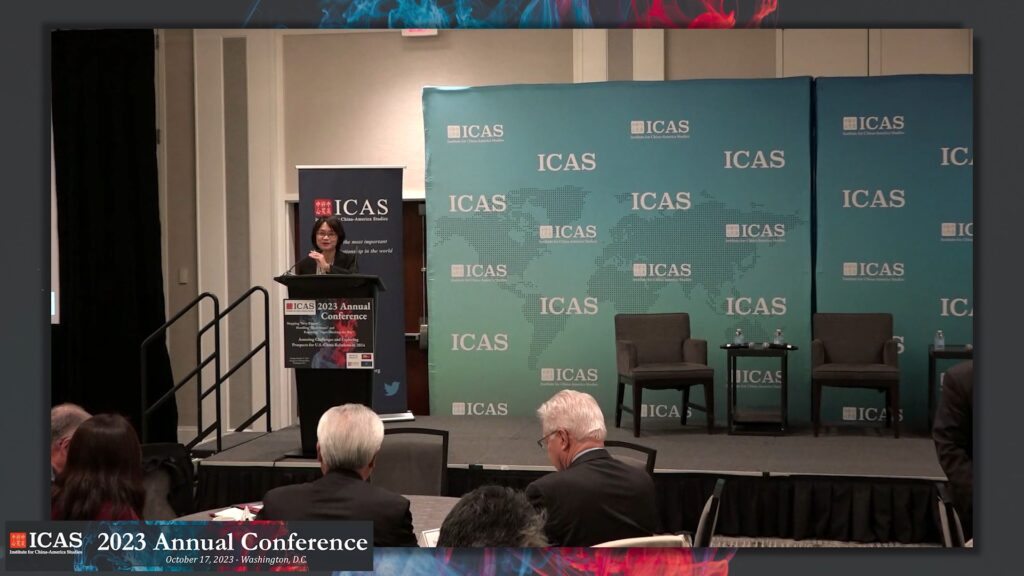

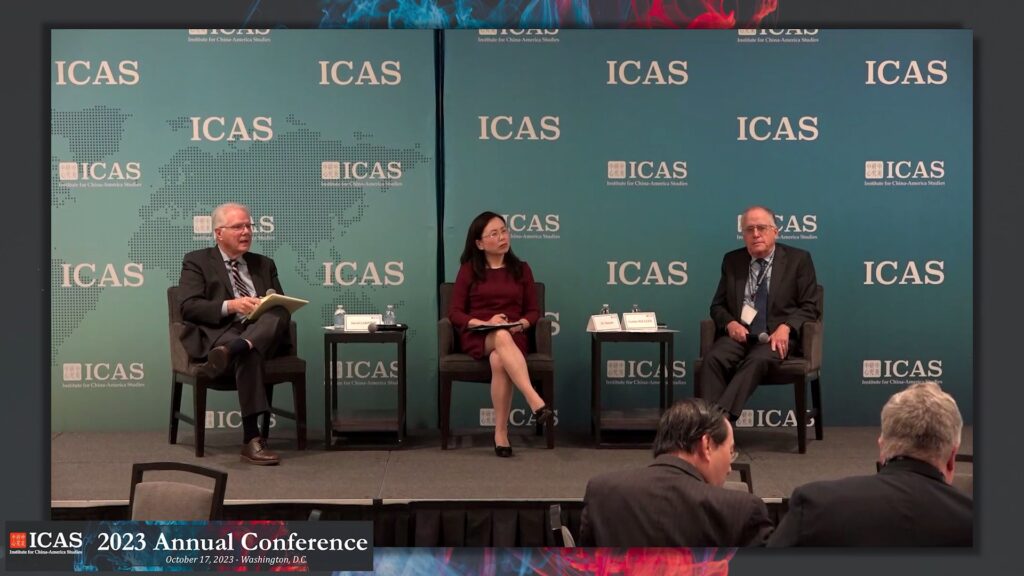


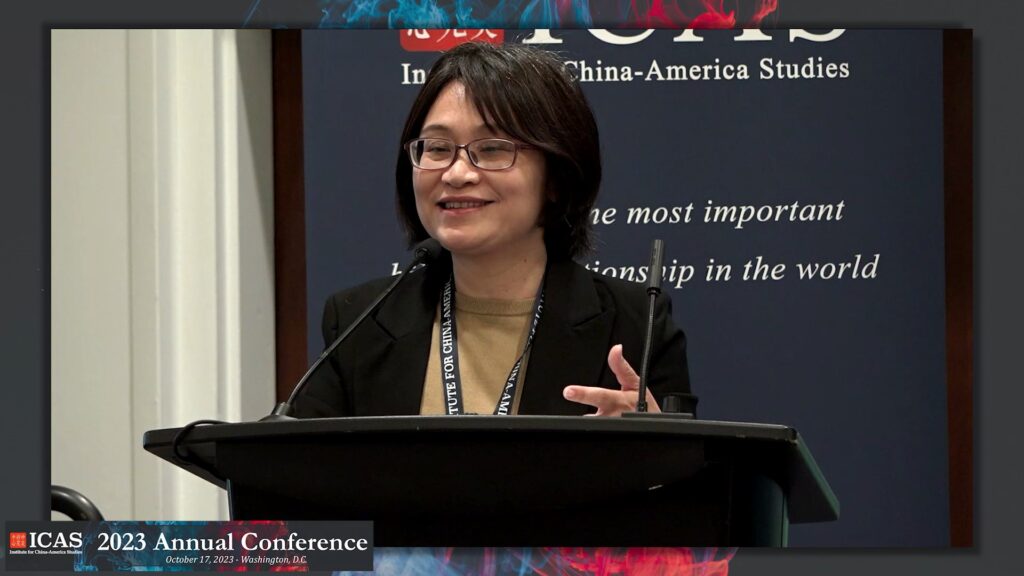
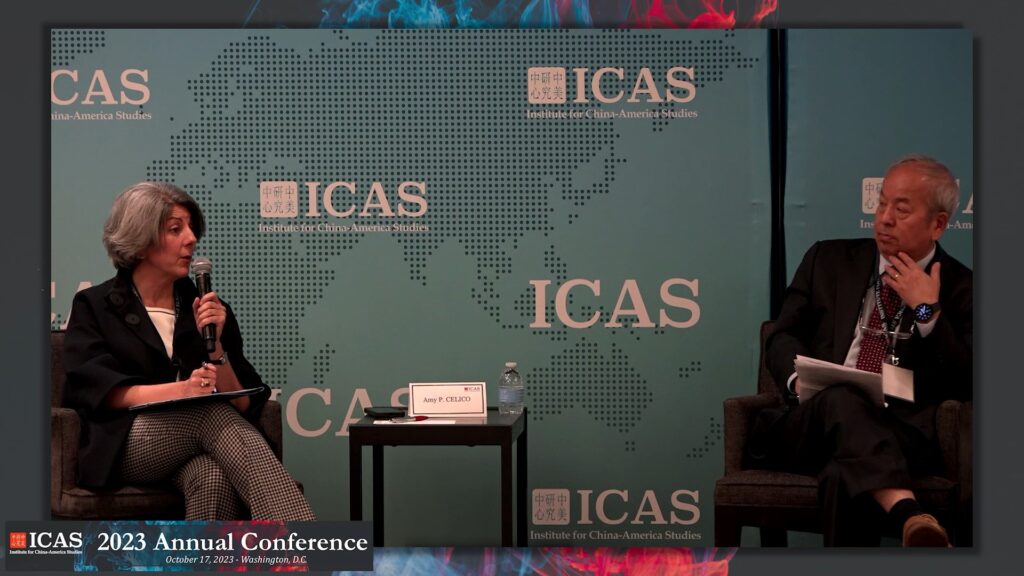
On October 17, the Institute for China-America Studies (ICAS) organized its 2023 Annual Conference. With COVID-19 thankfully more or less in the rear-view mirror, the conference was held in full, in-person format for the first time in more than four years. Dr. Hong Nong, Executive Director of ICAS, opened the conference and Dr. Wu Shicun, Chairman of ICAS’ Advisory Board, delivered the introductory remarks. In his heartfelt message, Dr. Wu spoke of the pressing need for both sides to present a forward-looking vision of ties so as to remove risks to the bilateral relationship and stabilize its long-term development. China and the United States are not fated to fall into a ‘Thucydides Trap’, and decision-makers on both sides must ensure that such a circumstance does not come to pass. Casting his own family’s experience as a typical example, Dr. Wu referred to the innumerable people-to-people ties that many Chinese share with the United States and the American people at large. Such relationships must never be decoupled, he noted, and future generations of Chinese and Americans must not pay the price of bad decisions that are taken today. Concluding, he hoped that the annual conference would throw up vibrant ideas and solutions to the many challenges being faced and articulate a new paradigm of ties that could rehabilitate and relaunch China-U.S. relations on a stable track for the next quarter century…
Dr. Wu’s introductory remarks was followed by the highlight of the conference—a keynote dialogue featuring Madam Xu Xueyuan, Deputy Chief of Mission & Minister at the Embassy of the People’s Republic of China in the United States, and Professor David Lampton, Professor Emeritus of China Studies at the School of Advanced International Studies, Johns Hopkins University.
Following two experts panel discussions—one on “Cooperation, Competition and Rivalry in U.S.-China Relations” and the second on “Taking Stock of Selective Decoupling in U.S.-China Economic Relations”—the ICAS 2023 Annual Conference was rounded off by a keynote luncheon address by Ms. Amy Celico, Partner at the Albright Stonebridge Group and an ex-senior U.S. government official in both the foreign service and international trade capacities.
US-China Global Maritime Relations
By Nong Hong (Routledge, 2024)
Description:
This book explores the U.S.-China maritime relationship, examining the development and implementation of the maritime strategies of both the United States and China.
Delving into the U.S.-China maritime relationship within the global context, the book investigates six key maritime regions: the South China Sea, the Northeast Asia waters (the East China Sea, the Yellow Sea), the Indian Ocean, the South Pacific Ocean, as well as the Arctic and Antarctic regions. Its observations form a comprehensive exploration of these regions and their significance in shaping the dynamics between the two nations, and this analysis reveals that an expanded view is necessary to discover and clearly display the role that these maritime regions currently—and could potentially—play in overarching U.S.-China relations.
Examining both the ongoing conflicts and opportunities for cooperation in the global maritime domain between the United States and China, this book will be a valuable resource to students and scholars of international relations, Chinese and U.S. politics, strategic studies, and maritime studies.
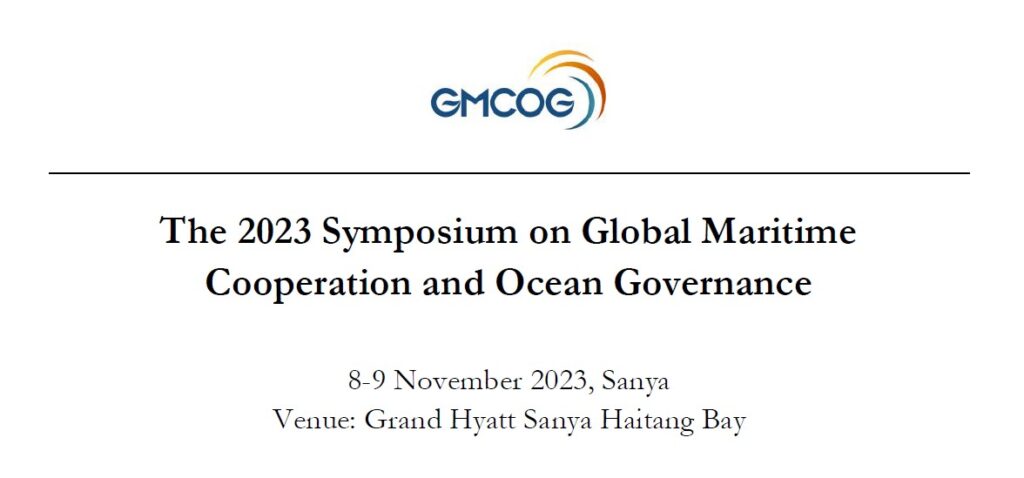
ICAS research fellows will participate in the upcoming Symposium on Global Maritime Cooperation and Ocean Governance 2023 taking place in Sanya, China from November 8-9, 2023.
Released the first week of every new quarter, the BCCC Quarterly is a magazine-style newsletter that records the most important trends and developments regarding blue carbon and climate change policies and regulations in China, the U.S., and other regions, as well as international regimes such as the United Nations. It also includes two special sections — the ‘Theme of the Quarter’ and the ‘Blue Carbon Country Profile’ — that aim to bring a fresh element to each issue.
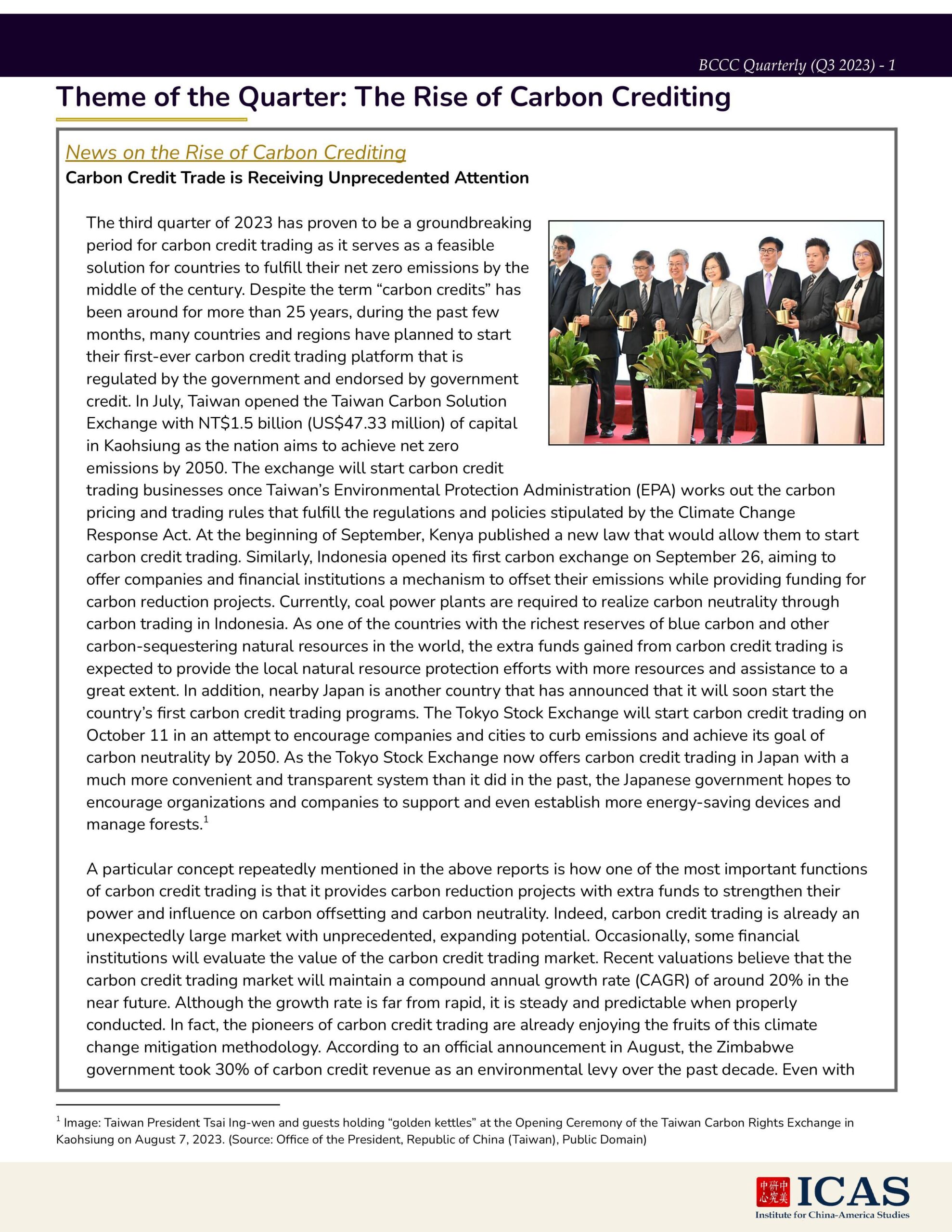
The Theme of the Quarter, examining The Rise of Carbon Crediting, was written by ICAS BCCC Research Assistant Intern Zhangchen Wang.

The Blue Carbon Country Profile, focusing on Pacific Island Countries and Territories (PICTs), was written by ICAS BCCC Research Assistant Intern Zhangchen Wang.

The Institute for China-America Studies is an independent nonprofit, nonpartisan research organization dedicated to strengthening the understanding of U.S.-China relations through expert analysis and practical policy solutions.
1919 M St. NW Suite 310,
Washington, DC 20036
icas@chinaus-icas.org
(202) 968-0595
© 2025 INSTITUTE FOR CHINA-AMERICA STUDIES. ALL RIGHTS RESERVED.